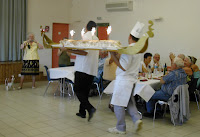senior frolic
Now that the editor of the WeHoNews has published a map of France showing the exact location of Meynes I suppose the next thing I’ll see will be chartered busloads of WeHoans showing up in the village square with guide books, cameras and bottles of Evian water. Just remember what I told you: there’s nothing happening here…
Unless you’re lucky enough, as I was last Sunday, to be invited to a luncheon/dance organized by the joyful, gregarious members of the Club du Troisième Age (senior citizens) from Meynes and Sernhac, its neighboring village, who know how to throw a party and enjoy it.
The doyenne of Meynes, Madame Blanchou, invited me and a few other youngsters, who normally wouldn’t dream of going to an old folks’ party, to be her guests at this special event. What made the invitation irresistible, as Mme. Blanchou very well knew, was the menu, catered by a local renowned chef, featuring one of the great specialties of the south of France: aioli.

If you don’t know aioli let me tell you you’re missing something. Aioli is a dish based on a sauce of home-made mayonnaise made from fragrant olive oil and fresh eggs flavored with garlic; not just flavored but reeking of garlic, in exactly the right proportion to give exquisite flavor to the boiled fish and vegetables served beside it. The garlic makes this feast come to life.
The members of the Club de Troisième Age may have grey hair, some may need canes, some use walkers, some are a litt
 le hard of hearing and some a little out of breath, but these senior citizens know how to have fun; they love to eat and drink and cut up the dance floor wites orh fancy steps.
le hard of hearing and some a little out of breath, but these senior citizens know how to have fun; they love to eat and drink and cut up the dance floor wites orh fancy steps.We sat at tables of ten and ate family style. The meal opened with a heady Kir accompanied by tiny pastries stuffed with olive paste and anchovies. The aioli sauce was presented in bowls, golden, fragrant, and in copious quantity to spoon generously over our food and dip our bread into. Then came great platters of boiled codfish, escargot, calamari and hardboiled eggs, with green beans, potatoes, cauliflower and carrots, baskets of crusty baguettes to help push things along, and three different wines from a neighboring vineyard to wash it all down.
"We’re lucky to eat with old people," said my friend Pierre as the platters were set down on the tables. "They eat so little; there will be much more for us."

Wrong! They packed it in like there was no tomorrow. The caterer was well prepared and additional platters heaped with steaming fish and vegetables appeared at the tables. After we’d had our fill of aioli we got green salad with two different kinds of cheese: a pungent blue and a gamy goat’s cheese from the region, nobly accompanied by the good red wine.
A DJ provided music that made everyone clap hands, sing along, get up and dance: tango, Paso Doblé, slow, polka, swing, the kind of old style accordion music you associate with French movies of the 40’s, but no rock and roll. Everyone who could stand was up on their feet.
I was impressed by the many ways the women—of all sizes, shapes and styles—found to express their femininity: a bit of lace, a colorful necklace, a hairclip, an alluring show of flesh, a cheerful twinkle of the eye, a sparkle, a flutter; some small unmistakable thing to remind the men that although they were no longer young they were still beautiful in the way that woman can be at any age. The French word for this is coquette, and it is indeed a French feminine quality.
The men were no slackers; they went from table to table getting the women up to dance, changing partners, smoothly guiding ladies across the room with their practiced styles. An American curiosity, I got more than my share of turns around the dance floor.

Suddenly, the music stopped, the lights flickered, then a drum roll, and with a great fanfare the dessert appeared, carried in on the shoulders of the chef and his assistant on a ten foot long platter in the shape of an ancient ship. "Omelette Norwegian," Blanchou told me, and everyone applauded as the flaming dessert was presented around the room.
Coffee was served and more dancing. I couldn’t keep up. Blanchou was still merrily pirouetting around the room when we youngsters finally gave up and went home.
I returned to my quiet stone house in the middle of the sleepy village of Meynes where nothing is happening. All is peaceful and calm, but behind closed doors I know there is life, and love, and joie de vivre.
pictures will come when I return to L.A.

